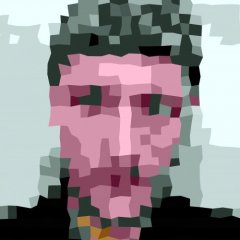968,600 Characters to Go
I recently finished reading《在延安文艺座谈会上的讲话》by 毛泽东. It is a series of five talks on literature and art that Mao delivered between February and May 1942 at Yan’an. In these five talks, Mao expounds the purpose of revolutionary literature, criticizes the defective thinking of his Yan’an comrades, and prescribes widespread intra-party thought reform for these defects.
Below is my loose paraphrase of Mao’s arguments with corresponding quotations from the text, and a brief thought on mainstream art in modern-day China.
=
Literature is a part of the machinery of the revolution. It is a weapon used to unite and teach the people, and to strike and destroy the enemy.
我们今天开会,就是要使文艺很好地成为整个革命机器的一个组成部分,作为团结人民、教育人民、打击敌人、消灭敌人的有力的武器,帮助人民同心同德地和敌人作斗争。
Literature is not neutral. Writers must be on the side of the proletariat, the people, and the Party.
我们是站在无产阶级的和人民大众的立场。对于共产党员来说,也就是要站在党的立场,站在党性和党的政策的立场。
Unfortunately, many comrades champion petty bourgeois ideas. They view the intelligentsia and petty bourgeoisie as more important than the workers, farmers, and soldiers. They stand with the petty bourgeoisie and express petty bourgeois ideas in their work.
在实际上,在行动上,他们是否对小资产阶级知识分子比对工农兵还更看得重要些呢?我以为是这样…… 他们是站在小资产阶级立场,他们是把自己的作品当作小资产阶级的自我表现来创作的
There is much of value in Chinese and foreign literature traditions. What has value should be kept. Older literary forms can be used, but they should be changed, filled with revolutionary content, and pressed into the service of the people.
对于中国和外国过去时代所遗留下来的丰富的文学艺术遗产和优良的文学艺术传统,我们是要继承的,但是目的仍然是为了人民大众。对于过去时代的文艺形式,我们也并不拒绝利用,但这些旧形式到了我们手里,给了改造,加进了新内容,也就变成革命的为人民服务的东西了。
Some comrades mistakenly believe that all art must flow out of “love,” as though love were some transcendent ideal untouched by social class. Others argue that literature should reflect “human nature.” But human nature is a concrete thing with a class dimension, not an abstract concept. What is often called “human nature” is actually capitalist individualism. Literature must not proceed from so-called abstract notions of love, freedom, truth, or humanity. The presence of these errors in the Party show that some comrades have been deeply influenced by bourgeois and capitalist ideas. These comrades should cast off this influence, and study Marxist-Leninist thought.
但是我们有些同志… 说什么一切应该从“爱”出发。就说爱吧,在阶级社会里,也只有阶级的爱,但是这些同志却要追求什么超阶级的爱,抽象的爱,以及抽象的自由、抽象的真理、抽象的人性等等。这是表明这些同志是受了资产阶级的很深的影响。应该很彻底地清算这种影响,很虚心地学习马克思列宁主义…… “人性论”。有没有人性这种东西?当然有的。但是只有具体的人性,没有抽象的人性。在阶级社会里就是只有带着阶级性的人性,而没有什么超阶级的人性。我们主张无产阶级的人性,人民大众的人性,而地主阶级资产阶级则主张地主阶级资产阶级的人性,不过他们口头上不这样说,却说成为唯一的人性。有些小资产阶级知识分子所鼓吹的人性,也是脱离人民大众或者反对人民大众的,他们的所谓人性实质上不过是资产阶级的个人主义,因此在他们眼中,无产阶级的人性就不合于人性
We must not love our enemies. We must not love noxious social phenomena. Rather, we must seek to destroy them.
我们不能爱敌人,不能爱社会的丑恶现象,我们的目的是消灭这些东西。
Many petit bourgeois writers write pessimistic literature that exposes the darkness in society without also showing the light. Capitalist writers invert light and darkness, portraying revolutionaries as thugs and themselves as saints. Only true revolutionary writers praise and expose correctly. All dark powers that harm the people must be exposed, and all the revolutionary struggles of the people must be praised. This is the fundamental duty of revolutionary writers.
许多小资产阶级作家并没有找到过光明,他们的作品就只是暴露黑暗,被称为“暴露文学”,还有简直是专门宣传悲观厌世的…… 反动时期的资产阶级文艺家把革命群众写成暴徒,把他们自己写成神圣,所谓光明和黑暗是颠倒的。只有真正革命的文艺家才能正确地解决歌颂和暴露的问题。一切危害人民群众的黑暗势力必须暴露之,一切人民群众的革命斗争必须歌颂之,这就是革命文艺家的基本任务。
Revolutionary writers must expose the invaders, the exploiters, the oppressors, and their harmful influence on the people. Revolutionary writers must not expose the people themselves.
对于革命的文艺家,暴露的对象,只能是侵略者、剥削者、压迫者及其在人民中所遗留的恶劣影响,而不能是人民大众。
Literature is subordinate to politics. But literature is also a tool of great political influence. Revolutionary literature is like a gear and a screw. These tools are less important than other parts of the machine, but the machine cannot function properly without them.
文艺是从属于政治的,但又反转来给予伟大的影响于政治。革命文艺是整个革命事业的一部分,是齿轮和螺丝钉,和别的更重要的部分比较起来,自然有轻重缓急第一第二之分,但它是对于整个机器不可缺少的齿轮和螺丝钉,对于整个革命事业不可缺少的一部分。
How can we know if the primary motivations of a writer are correct and good? Not by listening to what the writer says, but by observing the effect of that writer’s work on society.
检验一个作家的主观愿望即其动机是否正确,是否善良,不是看他的宣言,而是看他的行为(主要是作品)在社会大众中产生的效果。
In light of many false ideologies that have taken hold among the comrades, what is needed is a strict rectification campaign. Many comrades are unclear of the difference between the proletariat and the petit bourgeoisie. Many comrades have joined the Party with their bodies, but have only partially joined the Party in their thinking. The minds of these comrades are filled with the thoughts of the exploiting class; they do not know what proletariat thinking is, what communism is, what the Party is. So although most within the Party and its ranks are pure, for the future of our leadership, there must be a serious transformation in the thinking and organization of the Party. To transform the organization of the Party, first we must transform the thinking of the Party. There must be an ideological struggle against non-proletariat thinking.
同志们中间还有很多的唯心论、教条主义、空想、空谈、轻视实践、脱离群众等等的缺点,需要有一个切实的严肃的整风运动。我们有许多同志还不大清楚无产阶级和小资产阶级的区别。有许多党员,在组织上入了党,思想上并没有完全入党,甚至完全没有入党。这种思想上没有入党的人,头脑里还装着许多剥削阶级的脏东西,根本不知道什么是无产阶级思想,什么是共产主义,什么是党……
因此我们的党,我们的队伍,虽然其中的大部分是纯洁的,但是为要领导革命运动更好地发展,更快地完成,就必须从思想上组织上认真地整顿一番。而为要从组织上整顿,首先需要在思想上整顿,需要展开一个无产阶级对非无产阶级的思想斗争。
[end paraphrase]
=
A concluding thought: Back when I lived in China, I ascribed the bathos, banality, and overwrought patriotism of much modern-day mainstream Chinese music and television to government censorship. But I also sensed that such an ascription was pat and lacked explanatory power. Seeing mainstream Chinese music and television in light of Mao’s instructions on literature and art makes a lot more sense. One of the many things Mao did at Yan’an was come up with—and inculcate—a framework for understanding the making of art in modern China. He provided artists and future leaders of the Party with answers to questions like: Why make art? Who is art is for? What does art do? How should art be made? At Yan’an, Mao made a positive case for Chinese art that serves the people and their Party. This view of art was highly influential and informs the making of art in China to this day.
I became aware of Mao’s talks on literature and art through an episode of the Chinese Literature Podcast. A link to that episode is below.
Link to the text in Chinese:
https://www.marxists.org/chinese/maozedong/marxist.org-chinese-mao-194205.htm
Link to the text in English:
https://www.marxists.org/reference/archive/mao/selected-works/volume-3/mswv3_08.htm
Chinese Literature Podcast: “Art for the Masses: Mao Zedong’s Yan’An Lectures”
https://www.chineseliteraturepodcast.com/?p=493
Some statistics:
Characters read this year: 31,400
Characters left to read this year: 968,600
Percent of goal completed: 3.1%
List of things read:
《三八节有感》by 丁玲 (2,370 characters)
《我在霞村的时候》by 丁玲 (10,754 characters)
《在延安文艺座谈会上的讲话》by 毛泽东 (18,276 characters)



0 Comments
Recommended Comments
There are no comments to display.